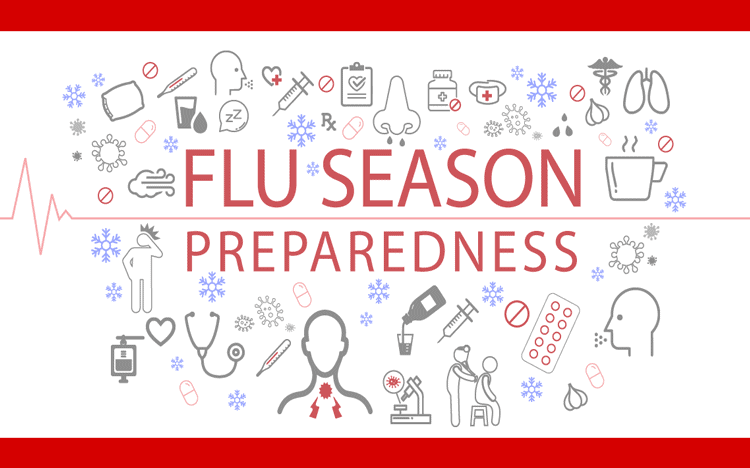Flu Season Preparedness: Stocking Up on Essentials and Creating a Family Plan

Are you ready for flu season?
It’s time to stock up on essentials and create a family plan to stay healthy.
In this article, we’ll discuss the importance of having necessary items on hand and share tips on how to prepare for potential school or work closures.
By following these guidelines, you can ensure that you and your loved ones are well-prepared and equipped to handle the challenges of flu season.
Key Takeaways
- Stocking up on food, water, and medication is crucial for flu season preparedness.
- Creating a family plan is important for everyone’s safety and well-being.
- Staying healthy during flu season involves practicing good hygiene, getting enough sleep, and maintaining a balanced diet.
- Planning for potential school or work closures includes considering alternative arrangements and exploring financial support options.
Importance of Stocking Up on Essentials
It’s important to stock up on essentials like food, water, and medication before flu season hits. When it comes to flu season preparedness, having emergency supplies is crucial.
You never know when a flu outbreak might occur, and it’s better to be safe than sorry. One of the first steps you can take is to make a list of necessary items and go grocery shopping ahead of time. Fill your pantry with non-perishable food items such as canned goods, dry pasta, and rice.
Don’t forget to buy enough water to last for at least a week. Additionally, make sure you have an ample supply of over-the-counter medication to alleviate flu symptoms.
Essential Items to Have on Hand
Make sure you have all the necessary items on hand, like hand sanitizer, tissues, and fever reducers, to stay prepared during flu season.
Preparing supplies for flu season is crucial to ensure you and your family are ready for any unexpected illness. Stocking up on essential items will help you create a reliable emergency kit that can be easily accessed when needed.
In addition to hand sanitizer, tissues, and fever reducers, consider adding masks, disinfectant wipes, and thermometers to your kit. These items will help you prevent the spread of germs, maintain good hygiene, and monitor your temperature.
Creating a Family Plan
Having a solid family plan in place is essential for ensuring everyone’s safety and well-being during unforeseen circumstances. One key aspect of this plan is family communication. It’s important to establish clear lines of communication so that everyone knows what to do and where to go in case of an emergency.
Make sure to designate a meeting place where everyone can gather if you are separated. Additionally, having a list of emergency contacts is crucial. Include numbers for local authorities, healthcare providers, and trusted neighbors or friends who can assist you in times of need. Keep this list readily accessible and make sure that all family members are aware of it.
Tips for Staying Healthy During Flu Season
Remember to wash your hands frequently and avoid close contact with others to reduce the risk of getting sick during flu season.
Here are some tips to help you stay healthy and boost your immunity naturally:
- Take care of yourself:
- Get enough sleep to support your immune system.
- Eat a balanced diet rich in fruits and vegetables.
- Stay hydrated by drinking plenty of water.
- Try natural remedies:
- Drink herbal teas like echinacea or ginger to help strengthen your immune system.
- Use essential oils like eucalyptus or tea tree oil to support respiratory health.
Preparing for Potential School or Work Closures
In case of potential school or work closures, it’s important to have a plan in place to ensure you are prepared. Such closures can have a significant impact on your daily routine and responsibilities. To help you navigate through this situation, it’s crucial to consider alternative arrangements. Here is a table that outlines potential impacts and suggested alternative arrangements:
| Potential Impact | Alternative Arrangements |
|---|---|
| Missed school/work days | Remote learning/work options |
| Childcare challenges | Finding a backup caregiver |
| Disruption to daily routine | Establishing a new schedule |
| Loss of income | Exploring financial support |
| Limited access to resources | Stocking up on essentials |
Frequently Asked Questions
Can I Use Hand Sanitizer Instead of Washing My Hands Frequently During Flu Season?
You can use hand sanitizer instead of washing your hands frequently during flu season. Hand sanitizer is effective at killing germs, but remember that hand washing is still the best way to prevent the spread of illness.
How Long Can the Flu Virus Survive on Surfaces?
The flu virus can survive on surfaces for up to 48 hours. To protect yourself, regularly clean and disinfect frequently touched objects. Use effective cleaning methods like using bleach or alcohol-based solutions.
Are There Any Natural Remedies or Supplements That Can Help Boost the Immune System During Flu Season?
Are there any natural remedies or supplements that can help boost your immune system during flu season? Yes, there are natural remedies and supplements that can boost your immune system and help you stay healthy during flu season.
What Should I Do if a Family Member Shows Symptoms of the Flu?
If a family member shows flu symptoms, seeking medical advice is important. Take precautions like wearing a mask and washing hands frequently. Isolate the sick person and disinfect surfaces regularly to prevent the spread of the virus.
How Can I Help My Child Cope With Potential School Closures During Flu Season?
To help your child cope with potential school closures during flu season, you can make childcare arrangements with trusted family members or friends. Additionally, explore online learning options to ensure they continue their education from home.








